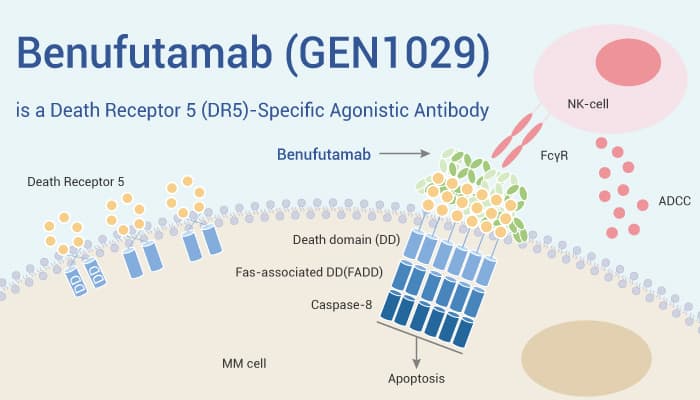Death receptor 5 (DR5), also known as TRAIL receptor 2 (TRAILR2) and TNFR superfamily member 10B (TNFRSF10B), is a cell surface receptor of the TNF-receptor superfamily that binds TRAIL and mediates apoptosis. Triggering of these receptors via TRAIL or agonistic antibodies selectively induced apoptosis in malignant cells derived from a variety of tumors. DR5 aggregation and higher-order clustering at the cell membrane is required for efficient signal transduction. And then, DR5 clustering can induce tumor cell death. Moreover, DR5 is an important determinant of response to ligand binding. However, therapeutic compounds targeting DR5 have achieved limited clinical efficacy. While monoclonal antibodies targeting DR5 have been developed.
Benufutamab (also known as GEN1029) is a death receptor 5 (DR5)-specific IgG1 agonistic antibody.

In addition, Benufutamab is a mixture of 2 noncompeting DR5-specific IgG1 antibody (Hx-DR5-01 and Hx-DR5-05), each with an E430G mutation in the Fc domain. This mutation enhances Fc-Fc interactions, resulting in antibody hexamerization, followed by FcγR-independent clustering of DR5 molecules. Mechanistically, the unique combination of dual epitope targeting and increased IgG hexamerization resulted in potent DR5 agonist activity by inducing efficient DR5 outside-in signaling and caspase-mediated cell death. Benufutamab induces potent cytotoxicity of primary multiple myeloma (MM) cells. Furthermore, in BxPC-3 pancreatic cancer cells, Benufutamab induces potent caspase-3/7 activation. Importantly, Benufutamab effectively induces apoptosis in a variety of preclinical solid tumor models. Moreover, in an HCT-15 cell line-derived xenograft (CDX) model, Benufutamab shows significant antitumor activity.
In conclusion, Benufutamab is a DR5-specific agonistic antibody, with potent antitumor effects.
References:
[1] Hilma J van der Horst, et al. Blood Adv. 2021 Apr 27;5(8):2165-2172.
[2] Marije B Overdijk, et al. Mol Cancer Ther. 2020 Oct;19(10):2126-2138.